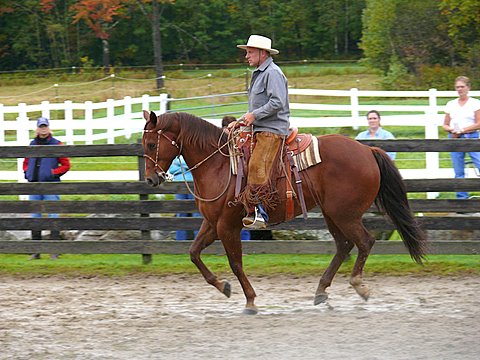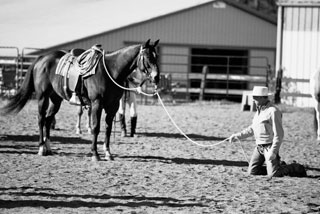
5 Propositions for the Phenomenon that is “Buck”
1. Because a talking cowboy is even better than a laconic cowboy
The myth of the ranch man wearing a slight bow to his legs and striding with stature of the free range is longstanding in our culture. Buck (Brannaman) though doesn’t merely bite a blade of grass between his teeth and decline to answer. He says things like, “I help horses with human problems,” and “this horse tells me a lot about you.”
2. Because he rides like a dream
I have a horse – and I can say that riding is probably the most difficult thing I do – a daily reminder that there’s really no such plateau as excellence, only striving. When you see Buck (and his daughter, Reata, who is a brilliant rider herself) as a man who is gifted in ways that seem to put him outside normal human experience, who can ride this wondrous way, it leaves you astonished; you might resort to cliches. Instead you’ve got to keep watching the movie, the riding, because the suspicion that slowly creeps over you is that it ain’t domination but inner strength that conveys grace.
3. Because of the stallion scene
Wildness and human beings are divorced. There is a lot of art made on this subject, about the changing signification of what we call “wilderness,” and at the same time, there is a longing to touch what we feel we have lost – even though we’re not sure whether we put it someplace, or whether it receded like a tide in a dream. Solastalgia. The stallion in “Buck” is a casualty of the human-wild divorce. Its dangerousness is a form of uncontrollable restlessness, unpredictability, something not only untamable but past caring about the relational obligation of what we call society. Then the lightning reflex demonstrates the quickness of the animal. Man as prey. It’s something to see and wonder about.
4. Because “Bob” Redford is in it
Ha. And “Scarlett” is a very young Johansson.
 5. Because intelligence is kindness (and Buck’s mother tells an awesome joke).
5. Because intelligence is kindness (and Buck’s mother tells an awesome joke).
We can’t all think like horses. But imagine that we can put in practice the goal that a respectfulness of encounter, never contempt, characterizes our relations. That if you offer true trustworthiness from the heart you can have a new experience with the untrusting. That the exchange of this new sort of relationship – trust not betrayal, respect not contempt, love not domination – is profound. Because horses with human problems are ourselves, in the mirror.
And, not least, because first-time filmmaker Cindy Meehl succeeds incredibly at making a story “arc” and hit very high notes, without compromising the reality of the situations between Buck Brannaman, clinicians (humans), and horses.
